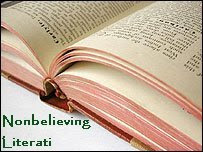NL: The Postman
 This time we read The Postman by David Brin.
This time we read The Postman by David Brin."Nobody ever notices postmen somehow," says Father Brown in The Invisible Man. Yet Brin chooses the postman as the beloved symbol of civilization which will catalyze its rebirth. It's an interesting conceit, though quite frankly, even in the 1980s did people even in small towns love their mail carriers so much? (Snarky aside: for someone who decides to hammer on feminism and the importance of women, "postman"? But having a sister who's a firefighter, right?, may have made me more sensitive of this than I ought to be. And I'm digressing.) The scene where everyone joins in telling their favorite "my childhood postman" cookies-and-milk saved-the-neighbor's-life story serves as the reason he is given the letters that allow him to bluff his way into Oakridge, which is the first real step on the road back.
Anyway, the plausibility of the premise isn't really the point. Brin isn't giving us a narrative, he's exploring an idea.
"More people died due to the breakdown and lawlessness -- the shattered web of commerce and mutual assistance -- than from all the bombs and germs, or even from the three-year dusk."That "shattered web" is evoked before Gordon ever dons the postman's uniform and takes up the bag, simply because he needs clothes and something to carry his stuff in, before he begins to tell people the lie that he represents a rebuilding government, and thus well before he has any idea that the lie can become the truth. Gordon's pervasive fear of periodontal disease is a symptom of that shattering, as is his longing for the little things. books, music, a hamburger, a hot bath... But there's more to it than that, of course. What Gordon's world died from is the American myth: the rugged individualist, the self-reliant stand-on-your-own-feet guy, the uber-survivalists who took what they wanted and destroyed the government (the evil government - "Franklinstein Civilization") in order to survive.
The book is about that web - not so much about the shattering of it, because Brin really isn't interested in that, but about the reweaving of it, and the necessity for that reweaving. It's also about the how. It's about myth (or lies, even if Noble), and hope, and it's about using the little things to kindle hope.
One of the problems with The Postman is that this intriguing concept is harnessed to David Brin's most (in my experience of him, though to be fair I haven't read him in twenty years) pedestrian writing. The characters are flat, and even when they die it's hard to care. The other problem is that the "novel" was originally unconnected short stories, and there's a disconnect between the "postman" and the "Cyclops" sections. The very end - the "surprise" revelation that ends the conflict - feels forced and a bit deus ex machina... okay, a lot deus ex machina.
Still, the ideas that Brin is exploring are still valid. The short-term predictions didn't come true and the militias aren't quite the force they used to be pre-Waco, but the ambiance of this shattered world is authentic. Feudal serfdom, male dominance, warring bandit chiefs - all the enemies of Civilization - they could certainly emerge. (Once, decades ago, I read a post-apocalyptic sci-fi novel, which one I can't recall, that had a line in it I'll paraphrase: When survival came to sharing, the British queued up - and survived.) So the question Brin is asking here is: What is it in America that supports Civilization, and what fights it - and how can we best harness the former to defeat the latter?
Part of that question seems to be equality - a characteristic which, by definition, cannot exist in a feudal society. It can exist in a tribal one - the isolated small villages - but then they cannot develop Civilization. (You may ask, so what? But one question Brin isn't asking is: Is Civilization good?) Equality of minorities, yes, but more importantly equality of women. Still, it's a flaw in the book that Brin doesn't really know how to make that point; he just tells us ("the women made me do it" complains the deus ex machina's deus ("sole relic of an age of near-gods" Brin calls him; at least he's got a sense of humor about it) but we don't see it).
Still, The Postman is an intriguing book. The question it's asking us is one we need to think about.
(next time: The Welsh Girl by Peter Ho Davies. Join us, why don't you? Just read, and post something on March 2. Here's the home page)
Labels: entertainment, nl






























3 Comments:
-
At 8:26 PM, January 15, 2009
 Anonymous had this to say...
Anonymous had this to say...
-
-
At 8:28 PM, January 15, 2009
 Anonymous had this to say...
Anonymous had this to say...
-
-
At 7:23 AM, January 16, 2009
 Unknown had this to say...
Unknown had this to say...
-
-
<-- Older Post ^ Home Newer Post -->the "novel" was originally unconnected short stories
I didn't know that.
The Welsh Girl looks like it will be a good read.
I always wondered if he was using the concept of civilization as a metaphor for humanity (the adjective, not the collective). If we lose our humanity, can we regain it and how do we do it? But is our humanity needed and what exactly is it that makes use human isn't addressed.
Post a Comment
Subscribe to Post Comments [Atom]